Cascade Hermitage to Focus on Monastics’ Support
Written by: Sarah Conover
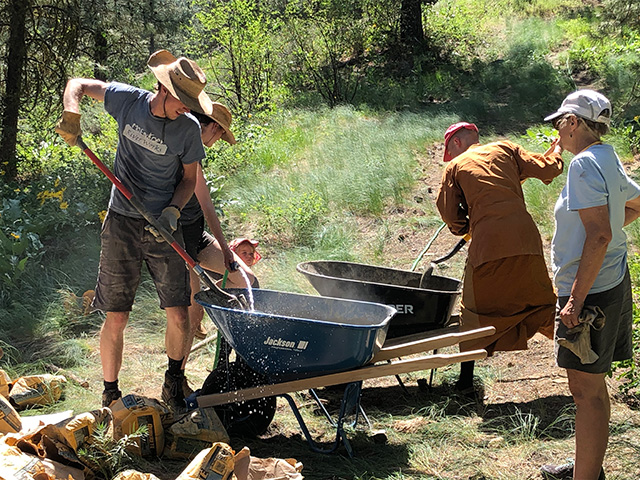
Tan Nisabho, Nick Littman, Sara Devins, Paige Devlin mixing cement at the Cascade Hermitage in May 2021.
Photos by: Sarah Conover, Doug Robnett
Instead of heading to palm-lined beaches for our “wrinkly years,” my husband Doug Robnett and I have relocated to northern Washington state, to open a small hermitage in the town of Winthrop.
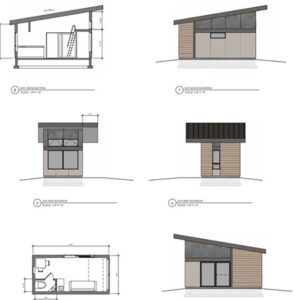
The 10 X 20-foot kutis are technically “sheds,” without running water or toilet, and with just enough room for a monastic to meditate, sleep and do walking meditation.
Our project, Cascade Hermitage, will offer retreat space for monastics of all Buddhist traditions, as well as for dedicated lay Buddhist practitioners when the huts aren’t occupied by monks or nuns. This will be a sister project to the forthcoming Clear Mountain Monastery, which our son Tan Nisabho plans to develop in Western Washington.
Our experience is that monasteries are often busy places, and as we’ve reached out to monastics over the years we have concluded there’s need for quiet, secluded, retreat places. We are launching Cascade Hermitage to fill this need.
The hermitage will be built on 20 forested acres just four miles from Winthrop. Wolf Creek runs through the land, and the base of 9,000-foot Gardner Mountain is accessible by hiking a forest path.
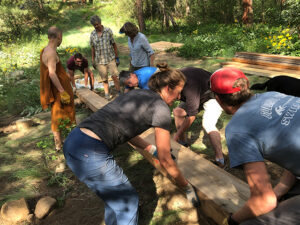
Tan Nisabho, Peter Gurche, Charley Gurche, Olga von Ziegesar, Doug Robnett, Ellie Matkin, Nick Littman lifting beams for a hut.
The center of the hermitage will be two retreat huts, called kutis in Thai forest tradition. Each 200-square-foot kuti will include an altar and place for seated meditation, an indoors walking path, and a longer outdoors walking path.
Living arrangements will include a small sleeping loft, a futon couch/bed for elders who’d rather not climb the loft ladder, desk and chairs, a library, and an electric tea kettle and cups. A small propane fireplace and heater, plus air conditioning, will support year-round retreat.
Each kuti will include a composting toilet, while showers and laundry will be available in our fully plumbed garage. Later, once our home is built, retreatants will have access to a private-entranced bathroom.
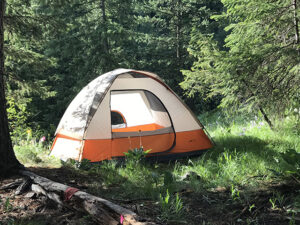
Tent on second monastic kuti site overlooking Wolf Creek.
Both kutis are to be secluded on a cliff above Wolf Creek, so the sound of the running water will be a constant, delightful companion. Each kuti will have plenty of windows and a glass sliding door to take advantage of the views. We also are building a path from the huts to a small cedar grove next to the river for monastics to refresh in private.
We plan to build one kuti this autumn, but construction of our house, and a second kuti, will have to wait for lifting of the current Methow Valley building moratorium. We will live in a cozy yurt until then.
Monks and nuns from Theravada and Mahayana traditions are our primary focus, and many will offer teachings at the hermitage and in the Methow Valley. Some visiting monastics will walk for alms in Winthrop and Twisp in their colorful robes with alms bowls in hand. We hope people will feel free to chat with them in a mutual getting-to-know you.
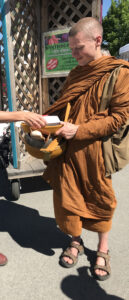
Tan Nisabho on alms round at the Twisp Farmer’s market near Cascade Hermitage, May 2021.
Monastic stays will be supported by dana as well as by a private foundation. Cooking for them will be done in our home by the hermitage stewards (Doug and myself for the time being) and volunteers, as the huts are not allowed cooking facilities.
How did we arrive at this life juncture? We began our Buddhist practice at Spirit Rock Retreat Center in California more than 30 years ago, but then moved to Spokane, Washington, pulled by kin, fewer cars and closer mountains.
Once arrived we began a search for sangha, a home spiritual community. Like moths drawn to a flame, we found little sangha lights to join, and also did some groundwork to create a solid group in the Theravada tradition. We also made many good spiritual friends, kalyanamittas, with the nuns at Sravasti Abbey north of Spokane.
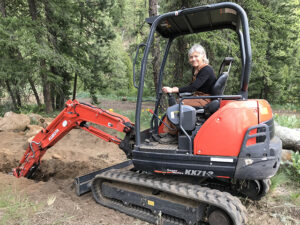
Sarah Conover digging trench for electric conduit on Cascade Hermitage property.
We raised our two children with Buddhism as our spiritual touchstone, which was a challenge in our conservative town. One child wanted our home religion kept a secret from her Christian friends; the other child went through an existential crisis in adolescence, read “Siddhartha,” and decided to pursue monkhood.
I remember the moment when Tan Nisabho, our now-monastic son, said to us with the doleful sincerity of a 16-year-old, “I just don’t think you adults understand how to deal with this suffering thing at all.”
He had a point. At our request he finished college, but instead of pursuing graduate school in psychology he ordained at Wat Marp Jan, a monastery of the Ajahn Chah Thai forest lineage in Thailand.
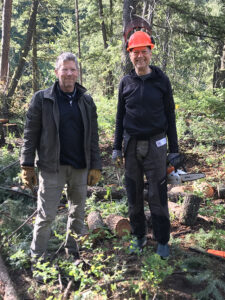
Doug Robnett and Charles Jasper reducing the fuel load around the kuti sites.
Having a renunciate in the family raises the practice bar and its blessings: as our son’s faith deepened, so did ours. As his circle of sangha expanded, we were able to meet and study with wonderful monks and nuns worldwide.
Now we wish to offer others a bit of the peace the dharma has brought to our lives. But what is already obvious is that we will be the true recipients of generosity–meeting many new kalyanamittas, and warming to the shining kindness that seems to accompany those who’ve chosen to serve life through monasticism.
Beginning this May, Cascade Hermitage began offering a weekly sitting, teaching from a monastic in residence or a livestream talk, and a community potluck held Sunday mornings at the Methow Valley Wellness Center, 105 Norfolk Road, Winthrop. The schedule is: 9:15 a.m. doors open, 9:30 a.m. sitting, 10 a.m. teaching; 10:45 a.m. meal offering and sangha potluck.
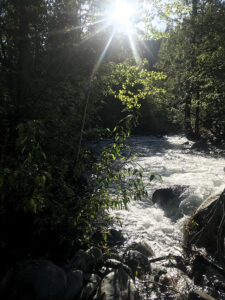
Morning sun over Wolf Creek swimming hole at the Cascade Hermitage.
We are extremely fortunate that Venerable Nisabho will be a part-time resident of Cascade Hermitage and will offer two-day non-residential retreats at the end of every month. All the teachings of the Buddha are considered “priceless,” and therefore given freely. Many, many thanks to Dr. Sierra Breitbeil and Michael Strauss for their generosity in allowing us to use their beautiful space for the weekly sittings as well as for the monthly retreats.
We hope to meet many Northwest Dharma News readers and practitioners in the future for the weekly gatherings, monthly retreats and more. There’s forest and construction work a-plenty to get the hermitage livable and fire safe, as well as camping, hiking, biking and skiing to enjoy. You can reach us through our Cascade Hermitage website if you have an inclination and/or skills to help us build this refuge from the ground up. We look forward to growing our sangha with you!
Sarah Conover is a Theravada practitioner of 30 years, and a dedicated student of Ajahn Sucitto, Thanissaro Bhikkhu, Frank Osteseski, and the nuns of Aloka Vihara, Dhammadharini, and Sravasti Abbey. Conover has taught meditation to a variety of groups, young and old, including to inmates at Airway Heights Corrections Center in Spokane. She wrote six books on world wisdom traditions for children and adults, and writes for Tricycle Magazine: The Buddhist Review, among other Buddhist publications.
